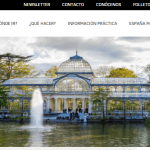SEGITTUR has prepared a Best Practices Guide for the five destinations (Benidorm, Gijón, Málaga, Santander and Tenerife) that have achieved at least 80% compliance with the smart destinations methodology, with actions in each of the five pillars.
The chairman of SEGITTUR, Enrique Martínez, has highlighted that “when we consider a dataset as being important, we place importance on what we are measuring. Projecting a data model that encompasses governance, technology, accessibility, innovation and sustainability anticipates the destination model being advocated. The major advantage of a data model is that it allows public policies to be made considering the priority public problems to be resolved”.
The “Guide of the most important actions in destinations receiving the Smart Destination recognition” aims to serve as a reference and source of inspiration and motivation for destination managers, organisations and industry professionals to learn more about success stories and make progress with the change towards the implementation of the DTI methodology.
Best Practices
Amongst the good practices implemented in Benidorm, worth particular mention is the DTI Smart Office, which comes under the governance pillar, making it possible to follow the strategy set out in the Benidorm DTI Master Plan; the Tourist Intelligence System or innovation in innovative public procurement to improve public services. Under the technology pillar, the SXXI tourist information office is worth particular mention, while in terms of sustainability, it has a sustainable mobility plan in place and in relation to accessibility, it offers an accessible tourist map of the city.
Gijón City Council has a data intelligence tool, Gijón DigitaLAb, in place for the accommodation sector, which analyses the performance of accommodation establishments and compares them with its four direct competitors, in addition to the Gijón_IN project aimed at more efficiently managing the destination. This is in addition to the energy management platforms that use blockchain or the use of augmented reality as part of promotion activities. As well as a sustainable urban development strategy and a municipal accessibility council.
Malaga City Council, with the city having been named the European Capital of Smart Tourism, started with strategic planning as a tool before various actions were added, such as an open data portal with customised dashboards, the commitment to open innovation through the M-Vial tool that facilitates decision-making processes to identify areas in which to innovate.
In terms of technology, Malaga has undertaken a wide variety of actions, such as a Big Data project, the Vitoria la Malagueña chatbot, an ecosystem of apps and a destination intelligence system. When it comes to sustainability, the city has a heritage protection and conservation plan in place as well as a responsible and sustainable tourism plan. On top of all of this is the Malaga Accessibility Plan or the city’s smart pedestrian crossings.
Santander/Tenerife
Santander’s smart office and the city’s Innovation Master Plan are key to promoting the DTI model in the capital of Cantabria, which also includes smart sensorisation at the service of destination management, the ecosystem of apps, the climate change office or the sustainability council, as well as the accessible mobility plan and the urban observers programme that undertake an annual review of the city’s urban accessibility.
In turn, Tenerife has designed the Artificial Intelligence Tourism Master Plan and the Smart Island Tenerife project in addition to the commitment to use other technologies applied to promotion such as 360º visits and the GOIO chatbot. In terms of sustainability, the island is working on calculating and offsetting the C02 footprint of tourist activity, while in relation to accessibility, in addition to the strategic plan, work has been undertaken on the accessibility of the tourism website, apps and guides.





